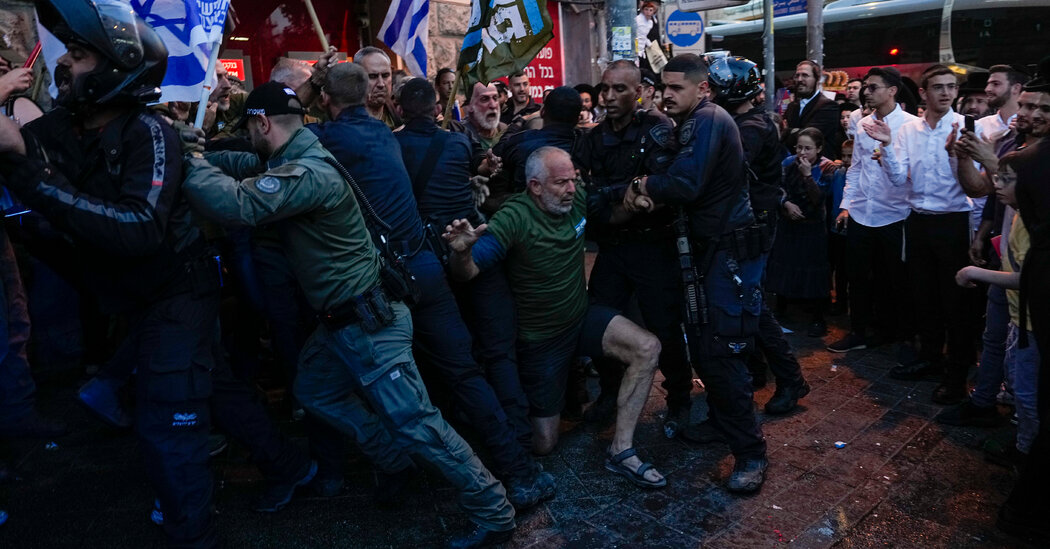Prime Minister Benjamin Netanyahu faced growing challenges to power on Sunday as thousands gathered outside Parliament to call for early elections in what were shaping up to be one of the largest demonstrations against the government in Israel since the start of the war in the Gaza Strip.
Some protesters carried signs calling for Mr. Netanyahu’s “immediate removal.” Others wielded posters calling for elections, saying “those who destroyed can’t be the ones to fix.”
The protest came a day after thousands took to the streets of Tel Aviv, waving flags and carrying pictures of the Israeli hostages with signs reading “Hostage deal now.”
Elad Dreifuss, a 25-year-old university student demonstrating in Jerusalem on Sunday, said that protesting against the government at a time of war was a difficult decision, but that “if the government can’t live up to its responsibility, something has to change.”
The protests in Jerusalem, which were planned to continue through Wednesday, came as in-person talks resumed in Cairo concerning a possible cease-fire and the release of hostages held by Hamas militants in the Gaza Strip. Bassem Naim, a spokesman for Hamas, said the group had not sent a delegation there.
Mr. Netanyahu has faced increasing pressure at home and abroad over Israel’s prosecution of the war in Gaza.
Close allies like the United States have criticized the heavy toll on civilians and have called on Israel to allow more aid into the enclave, where death and hunger are widespread. And many Israelis have demanded that Mr. Netanyahu prioritize the release of the hostages, taken by Hamas on Oct. 7 and still held in Gaza, as part of a cease-fire deal.
Some of the demonstrators outside the Knesset, the Israeli Legislature, in Jerusalem, were expected to remain in a cluster of tents there for several days.
“I believe Israel is facing one of the most difficult moments in its history,” said Moshe Radman, an entrepreneur who is helping organize the protest. “We need a government that will act for the betterment of the nation, not in the interest of political and personal considerations of a prime minister.”
Mr. Netanyahu, who underwent surgery to treat a hernia on Sunday evening, met in Jerusalem with families of soldiers who are being held in Gaza, his office said. Early Monday, his office said the procedure had been successful.
Mr. Netanyahu, criticized by many Israelis for failing to take responsibility for the deadly Hamas-led attack in October, is facing growing calls to resign. He has consistently rejected criticism of his administration and calls for a lasting cease-fire, saying that his government seeks a “complete victory” over Hamas.
At a news conference on Sunday, Mr. Netanyahu hit back at criticism that he had not done enough to bring the hostages home. “I’ve done everything in my power and will continue doing everything, to secure their release,” he said.
In recent days. pressure has grown on Mr. Netanyahu from another front as he has grappled with a dispute over a bill to extend ultra-Orthodox Jews’ exemption from compulsory military service. That dispute could lead to the collapse of his government, which consists of a right-wing coalition of secular and ultra-Orthodox lawmakers. If the state does not extend the exemption, the ultra-Orthodox lawmakers might leave the government. If the exemption is extended, the secular members could walk out.
With the war nearing the end of its sixth month, Israel has faced repeated calls to agree to a cease-fire. At Easter Sunday Mass, Pope Francis added his voice to those calls.
“I appeal once again that access to humanitarian aid be ensured to Gaza,” he said, “and call once more for the prompt release of the hostages seized on 7 October last and for an immediate cease-fire in the strip.”
Israel’s war cabinet was expected to convene on Sunday to discuss questions surrounding a possible cease-fire.
Talks have stalled because of divisions over the return of displaced Gazans to their homes, the permanency of a cease-fire and what an Israeli withdrawal from Gaza would look like, among other points. Hamas said last week that it had rejected an Israeli counterproposal.
One major sticking point is the fate of Palestinians living in temporary camps and shelters in southern and central Gaza. For months they have been hoping to return to their homes in the north, but in an interview, Ghazi Hamad, a senior Hamas official, said Israel was refusing to allow Gazans to go back to the north en masse, and was insisting that they do so under “strict conditions and a few at a time.”
Humanitarian officials have warned in recent days that only a cease-fire can allow aid groups to transport enough food and other supplies into Gaza to avert a looming famine. More than 32,000 Palestinians have been killed during the war, according to Gazan health officials. Some 1,200 people were killed in the Hamas-led attack, the Israelis say.
Egypt, Qatar and the United States, a staunch Israeli ally, have played the role of mediators in previous rounds of negotiations, with the two Arab nations serving as go-betweens with Hamas leaders. So far, however, a workable agreement has eluded all sides.
Reporting was contributed by Aaron Boxerman, Nada Rashwan, Cassandra Vinograd and Johnatan Reiss.

